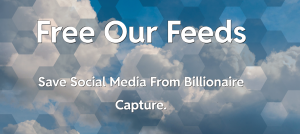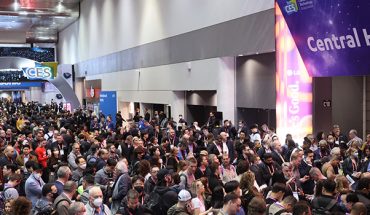Social media feeds and platforms today are private fiefdoms; what could be shared and open commons for the public benefit are firmly in the private grasp of individual billionaire owners.
That’s why an independent group of technology advocates – including a former Facebook investor, a leading web browser developer, and other top tech and thought leaders – is opening the door to a new social media environment, one where open governance of the social media system ensures it operates in the public interest, not a private one.
They call their initiative “Free Our Feeds”; it’s an expression of rising concerns about concentrated ownership and control of existing social media feeds like Meta’s or the X-Twitter platform. Both are run by strong willed billionaires who can shape the social media ecosystem and much of our social interactions to suit what often seems to be their own shifting priorities and principles. The concentrated ownership of social media platforms often has different priorities than the people using them; the owners’ power and influence are becoming more and more of a concern (joining a long list of concerns about the impact of social media usage overall).
Meta recently announced major changes to its content moderation policies, dropping fact-checking, loosening content moderation rules, creating concern and unease among people in marginalized or minority groups, for example. X has created concern and unease among its advertisers, losing as much as 75 per cent of its value after Musk took over. Should the legislated banning of TikTok proceed, which set of moneyed hands that platform ends up in is anyone’s guess. Musk’s? Trump’s? Shark Tank judge Kevin O’Leary’s? In any case, the platform comes with power for the owner.
Meta, which owns Facebook and Instagram, is a publicly-traded firm, but Mark Zuckerberg’s ownership of super-voting shares makes sure he is in charge. Elon Musk is the only director at X; he dissolved the company’s existing board of directors when he took over. The political power that coagulates in corporate environments like those has the means to its own ends; it often forms a “corporatocracy” with its own political and social priorities; the common good can become roadkill.
Free Our Feeds sees billionaire power and/or investor pressure as antithetical to the way social media and digital infrastructure should or could or would help connect people, if only open technology and transparent business practices were at play.
“[W]e have a clear pathway to securing the future of social media as a tool for connection, creativity, and joy,” Nabiha Syed, Executive Director of Mozilla Foundation and one of nine “custodians” overseeing the project, said in a statement. “But it will take community-driven resources and independent infrastructure to ensure it remains free from the pressures of venture capital and billionaire capture.”
So the Free Our Feeds group will use an open-source technology called the AT protocol to build and underpin social media applications that are not controlled by an individual or single company. It is used to put in place what’s known as a “second relay system”, a kind of backup or index of all content on the network. It’s one way to ensure access to the content (by users and developers) even if ownership should feel differently one day.
The AT protocol (as opposed to the familiar HTTP protocol) current powers the Bluesky social network, for example. It allows anyone to develop their own social media applications, much as we can now build our own websites, and to launch new social media apps like – or better than – TikTok or Facebook.
In this way, the FreeOurFeeds initiative takes its cue from the “fediverse”, a confederation of online platforms and applications that operate in an open, decentralized and independent manner (to the point of independent servers with independent operating rules, as opposed to other social media feeds which operate with one set of rules on one single centralized platform.
Bluesky, Mastodon, PeerTube, and other self-hosted social networking sites are pointing to a time and space where creative, constructive online communities can operate free from algorithmic targeting, data exploitation, or corporate manipulation. The fediverse uses common and interoperable communication protocols such as AT and ActivityPub, which is an official standard recognized by the W3C Social Web Working Group.
Over the past few months, certainly over the time Musk and X have been paired in the spotlight, the AT-powered Bluesky social platform has achieved tremendous growth, both in terms of actual participants and eager investors; reports indicate that new funding, led by Bain Capital Ventures, value the platform at nearly $700 million.
“Bluesky is built on values we share, by people we admire. However, founders are not companies,” the FreeOurFeed’s FAQ reads. “They will come under the same pressure all businesses face to maximize return to their investors.”
Other notables who helped launch the campaign include Wikipedia founder Jimmy Wales, Mozilla Foundation president Mark Surman, venture capitalist Roger McNamee, technologist Robin Berjon, actor Mark Ruffalo, musician Brian Eno, director Alex Winter, writer Cory Doctorow, and others.
The campaign is now raising $4 million as part of a larger $30 million effort. At last look, the campaign had raised more than $46,000 from some 800 donors on GoFundMe. The Free Our Feeds foundation aims to be operational by the end of 2025; Development Gateway, a U.S. nonprofit organization, will hold funds raised through the crowdfunding campaign, and the foundation says it will return the money if it doesn’t raise enough funds.
# # #

Free Our Feeds expresses rising concerns about concentrated ownership and control of existing social media feeds like Meta’s or the X-Twitter platform.
-30-



